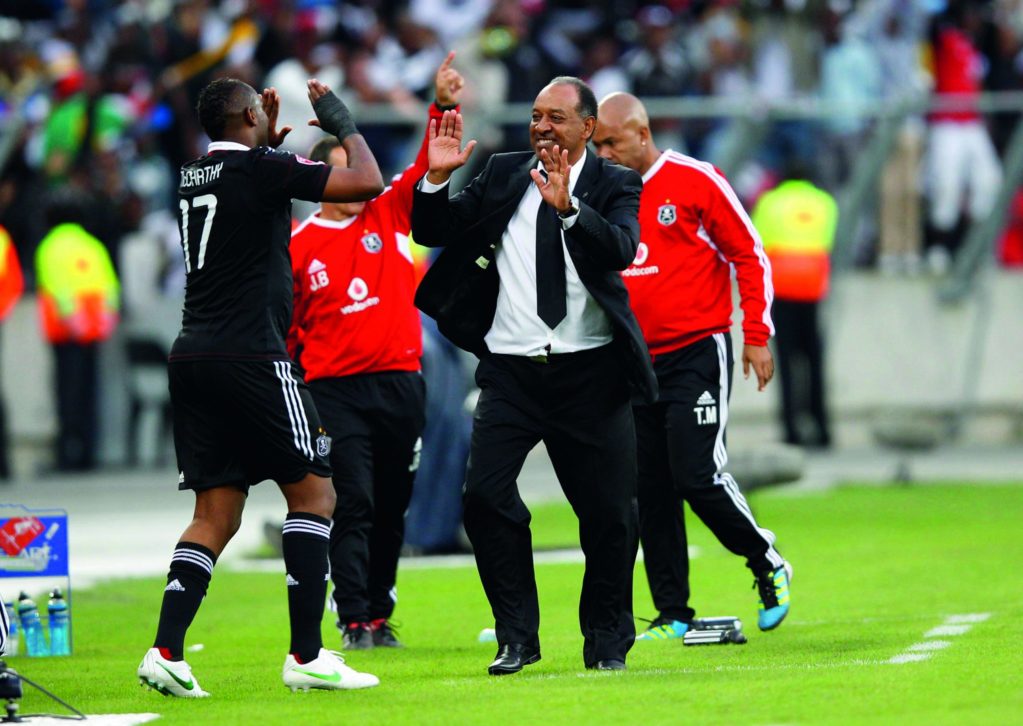When you first meet him, you wonder how a Peruvian, who struggles with his English, can get his message across to his squad of players. When he is out on the field in training, all you can make out is the exaggerated gestures and loud, booming voice. To the observer, it seems like a man under pressure, with a fiery temper, who is not quite sure what he is doing.
Think again. There is one thing Augusto Palacios is fluent in and that is football.
His first language is football and he turned around a team in turmoil to become the champions of the South African Premier Soccer League.
When Palacios took over the reins at (South African football club) Orlando Pirates it was after the sacking of Júlio César Leal in March, as the defending league champions began to languish four points behind a strong Mamelodi Sundowns team. Despite a 3-0 thumping at the hands of a lowly Santos side, in his first game in charge, plus a 2-1 home defeat to Free State Stars 10 days later, Palacios systematically worked his way to the top of the table.
The 60-year-old former striker began his career as a coach in 1981 and moved to South Africa to take charge of the Witbank Black Aces in 1983. Nearly three decades later, the technical director of development at the Buccaneers stepped up to lead the Orlando Pirates team to the title.
Loading...
“Coming in, in the middle of the season and entrusted with the task of defending the league at all costs, was a task that I had to undertake knowing that I could not afford to make it go wrong,” says Palacios.
“Coaching Orlando Pirates last season, under the circumstances the team was in, was with no shadow of a doubt to me the highest point of my professional coaching career. Since my arrival in the country and after I decided to get into coaching, the first thing I endeavored to do was to understand how local players think. It might seem simple, but players in every part of the world think differently.”
Palacios also offers great insight into the South African game like few others can, added to his typical short and to-the-point assessments.
“People are wrong about South African footballers; they think they don’t have skill. Normally, it’s the right combination of skill and technique… I tell the players in training, ‘no lose the ball, no lose the ball—pass to the player who is closest to you and play it safe.’ Something I don’t understand and I always correlate to the players; how it is possible you can lose the ball when there’s no life in the ball. It’s immaterial—I don’t understand how you can make the wrong pass. You are human beings who have brains, you train for this but then you make the wrong pass.”
His strong words have an effect on his charges, but to the crowd, he was not always hailed a hero this season.
Under Leal, Pirates supporters would bay for substitutions and the-then coach would often succumb to the will of the spectators. Palacios, however, adopts a contrasting approach.
“I think from when I came to South Africa I know the habits of the supporters. The supporters can’t make changes for me. The supporters can’t make substitutes for me—never. One thing I cannot do is to let the supporters coach. The supporters don’t make me make the substitutions, but they are not stupid—they can see if a player is missing chances and they see it as a habit.”
Pirate’s fans thought Palacios was merely a good caretaker coach, but have been won over by the successful championship defense.
“I heard Palacios [talking to] Robert Marawa on radio on the last Thursday of the season. They asked him about his coaching tactics and he said after he lost to Santos and to Free State Stars, the average coach would have taken the players back to more physical training, but he took them far away from football and they had fun. When they came back to training they were told they could have any position in the team for that session. So Benni McCarthy went from striker to goalkeeper and the two center backs went [on] to be strikers. Voila, on the last day of the season the people who changed positions all scored to win us the title… That’s genius,” says Toto ‘AngelHeart’ Mothopeng, who has supported the Pirates since 1986.
One of the Peruvian’s old assistants, former Bafana Bafana captain, Steve Komphela, has worked with Pirates tactician for years.
“Augusto introduced me to captaincy in the national team. Augusto molded me as a center back. We used to have our moments of fighting and all that and I’m very close to his family. To me it is more than standing next to the master, or someone who taught you the trade; it’s more like standing next to your mentor and your father,” says Komphela.
The wily Palacios was confirmed by the club at the end of May as coach on a one-year contract.
“Football is my passion and I cannot see myself doing something else away from this game. I remember the first game I sat on the bench against Santos, I met some of my former players and friends, who are now coaching in the Premiership. Those were emotional moments for me—every time we would play a certain team, I would always meet a former player, whom I coached before or played against.”
Palacios has made a rapid transformation, from the under-the-radar youth director, to the guiding spirit of the Soweto giant—one of the biggest clubs in Africa. In this uncertain world where clubs are turfing out coaches on a whim, Pirates would best be advised to hang on to Palacios as long as they can.
Loading...
